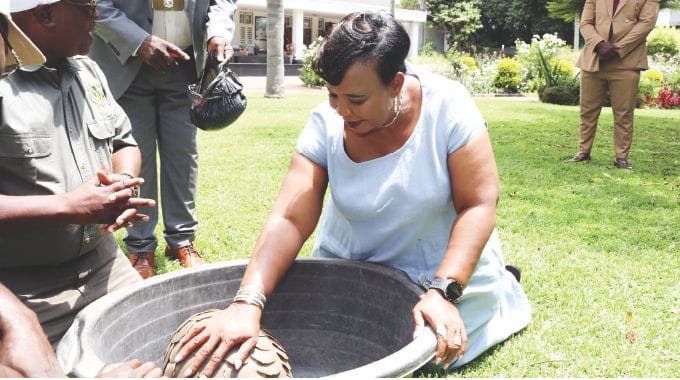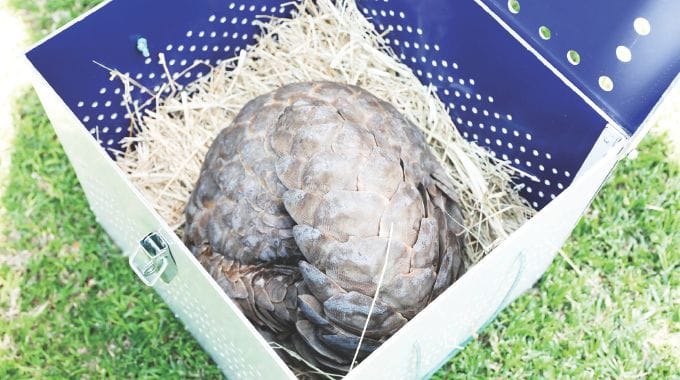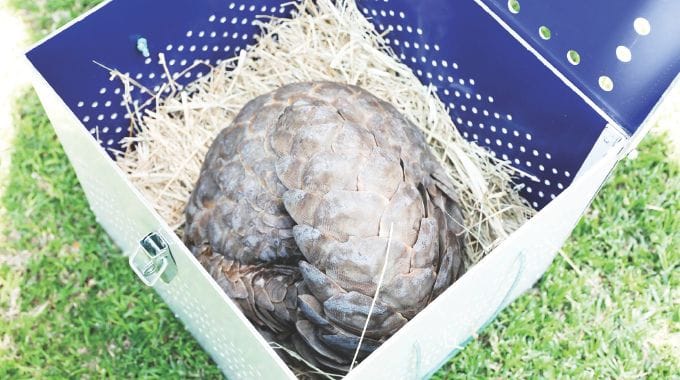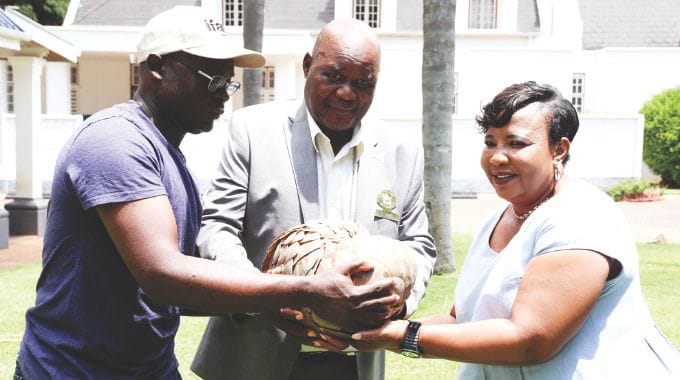First Lady rallies communities to protect endangered species
Tendai Rupapa
ENVIRONMENT and wildlife patron First Lady Dr Auxillia Mnangagwa has reiterated the need for people to protect endangered species so that they are not at a high risk of becoming extinct.
Dr Mnangagwa said this when she received a female pangolin from Headman Clive Makusha Chimbi of Mvuma, for onward transmission to the Zimbabwe Parks and Wildlife Management Authority (ZimParks), in her capacity as the patron.
Amai Mnangagwa, an avid environmentalist, recently launched the Pangolin Conservation Strategy and Action Plan in Manicaland.
The plan was developed to guide and coordinate actions for the effective conservation of this threatened and highly trafficked animal.
The First Lady said protecting endangered species was a complex issue that requires a multifaceted approach.
Dr Mnangagwa took time to raise awareness on anti-poaching in order to protect wildlife for posterity and for the preservation of the country’s rich cultural heritage.
“I received a call from Headman Chimbi from Chirumhanzu where I was a Member of Parliament. He informed me that he had come across a pangolin in his community which he wanted to hand over to me as the patron of wildlife.
“I then invited ZimParks representatives so that I could hand it over to them for safekeeping. He has brought the pangolin which is pregnant.
“In our country, we value pangolins which are integral parts of cultures, traditions, and folklore. Therefore, they should be protected,” she said.

She thanked Headman Chimbi and his community for protecting the pangolin.
“Dai vari vamwe vakatouraya mhuka iyi kana kuidya, but they did not because they know its value and importance. I really want to thank you. Protecting and conserving our diverse wildlife populations is essential for maintaining healthy ecosystems and preserving our natural heritage.
“By working together at all levels, nurturing our environment, protecting our wildlife and embracing sustainable practices, we can build a sustainable and resilient future for our planet and future generations.
“Hatifanire kupedza nhoroondo yekuti vana vedu vachauya vazodzidza kubva mairi; pangolins should be protected for the benefit of future generations. I am happy that ZimParks officials noticed that the pangolin is pregnant, meaning there will be more of them,” she said.
Forestry management and wildlife conservation, the First Lady said, were closely intertwined with sustainable development and the preservation of biodiversity.
Dr Mnangagwa handed over the animal to ZimParks and pledged her commitment to always check on it.
After handing over the threatened and highly trafficked animal to the First Lady, Headman Chimbi commended the mother of the nation for her stance with regard to the protection of the environment and wildlife.
He said as communities, they were learning a lot from the First Lady’s teachings.
“I am happy that Amai as the wildlife patron has accepted to receive this animal and hand it over to the relevant authorities. I came across this animal in my area of jurisdiction.
“Knowing that this animal is important and that it is a crime to keep it, kill, sell or consume it, I decided to give it to Amai so that she can give it to those who are trained to look after it.
“As traditional leaders, we actually frown upon people who kill pangolins, imhosva hombe.
“We are thankful to Amai for her awareness campaigns countrywide on environment and wildlife preservation,” he said.

Head of Security and Investigations in the Ministry of Environment and Wildlife under ZimParks, Mr Philemon November, paid tribute to Amai Mnangagwa for her dedication and passion to preserve the country’s wildlife for future generations and for ensuring that the natural resources are given special attention.
He added that the step taken by Headman Chimbi was a significant milestone in the conservation efforts, and it shows that communities are alive to the issues pertaining to the protection of natural resources.
“On behalf of the director-general, I would want to thank Amai, Dr Auxillia Mnangagwa, for a sterling job in making sure that the natural resources of Zimbabwe are given special attention and conservation takes its centre stage so that we minimise unwanted destruction of the ecosystem services through poaching and illegal wildlife trafficking.
“In that regard, she has taken it upon herself through what I would term political will at the same time, where she has gone out there to conscientise all the communities of Zimbabwe to be knowledgeable on the fundamentals of protecting our natural heritage, which we have seen today culminating into Headman Chimbi vabva kuChivhu, coming all the way to Harare to hand over a specially protected animal in the form of a pangolin,” he said.

He added that in Zimbabwe, there is the ground pangolin, which is what the headman brought to the First Lady.
“This is a significant milestone in our conservation efforts. It then goes to show that the communities are very much aware and very much alive to the protection of our natural resources.
“Pangolins are categorised as specially protected animals. They are in the same category with rhinos, our cheetahs, and our spotted hyenas.
“We do have a scenario where these animals are given specialist attention in terms of protection because of their numbers and poaching that will have taken a centre-stage worldwide or in our natural range state.
“Where we need to give them special protection unless if that is not taken into consideration they will go into extinction.
“So under CITES, the Convention on International Trade in Endangered Species of Wild Flora and Fauna, animals are categorised,” he said.
Mr November added that if anybody is arrested with a pangolin, for purposes of selling it or moving it without a permit, that person is arrested and charged under the relevant statutes.
“Upon conviction, one is sentenced to a minimum mandatory jail term of nine years because the idea is to make sure that we prevent would-be offenders from continuing to perpetuate their heinous crimes, which will lead us into a paper park without any animals thriving in the ecosystem services,” he said. – Herald

